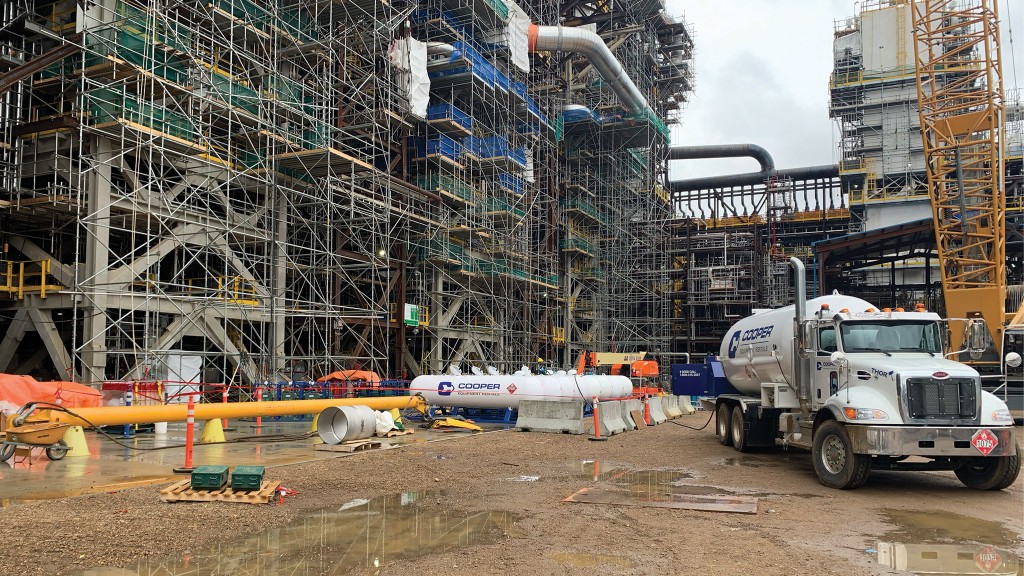How propane can increase job site productivity and help lower emissions
Education and training are essential to ensure safe propane use on the job site

Several factors go into how a contractor chooses to power their job sites. The size of site, the number of workers, the length of the project, and the equipment and other materials being used must all be accounted for. Construction job sites can be complex ecosystems and are often a tough environment to work in. In Canada, cold winters pose many challenges. But what if there was a fuel that could help power your job site while keeping costs, emissions, and safety risks down while helping productivity remain high?
While there may be all sorts of propane tank myths floating around, propane is one of the safest and most versatile fuels on the planet. It's most commonly used to provide temporary heat, but it has other applications as well — such as powering generators and other equipment like aerial lifts and booms.
The biggest challenge is ensuring that the people who are carrying, maintaining, and installing the fuel are properly trained and/or qualified. Propane may be reliable and efficient, but it can be dangerous, and even deadly, if it's misused. However, if you're looking to reduce your costs and increase productivity all while keeping your workers safe, propane can be an easy and effective fuel solution that minimizes environmental impact and maximizes efficiency.
Operational benefits make propane a great fuel source when used safely
The use of propane-powered heating equipment can help ensure projects finish on time and on budget. When it comes to the comfort and safety of workers, propane-powered heaters are also better at maintaining the ambient temperatures necessary for tasks like drywall or cement installation. No one holds budget to replace drywall or fix cracks in concrete that result from incorrect ambient temperatures. With new advancements in heat monitoring technology, contractors can also receive notifications for even the slightest change in temperature or humidity.
When it comes to safety, real-time monitoring can help with that too. Overheating is one of the most common winter hazards — especially in areas with a lot of combustible materials. On the other hand, lack of heat in the winter months can also be detrimental to your workers' safety and productivity. We are also seeing regulatory bodies setting specific heating standards at construction sites to protect materials and ensure worker safety in the event of an incident.
Do you know how to safely integrate propane into your fuel mix?
Propane can efficiently fuel your power generators and other equipment — all while lowering emissions and saving money, making it easier to finish projects safely on time and on budget. Since emissions regulations are getting stricter (especially for indoors and in residential areas) propane's naturally odourless, non-toxic, and low combustion qualities make it safer than diesel or gas-powered engines. At Cooper Equipment Rentals, we are seeing an increased investment in propane-powered generators to heat office trailers, thaw grounds, and heat job sites since they are quieter, cleaner, and more cost-effective than diesel generators.
We're also seeing propane-powered scissor lifts, forklifts, and telescoping booms that are as reliable as diesel and gas-powered equipment but with lower fuel costs. The fuel savings goes far beyond the day-to-day fuel costs as propane-powered equipment is also typically less expensive to rent and has lower maintenance costs over its lifetime.
Education and training cannot be overlooked
Propane is gas under pressure and can pose a significant danger when cylinders are being transported, stored, and connected, or when people are working in areas with propane heaters and torches. Workers must know and follow the correct propane safety regulations. They must know how to identify a propane leak and understand the importance of keeping propane containers away from ignition sources, combustible materials, air intakes, and building structures. They should also be aware that propane tanks should never be below grade or near open excavations. Direct-fired heaters like propane have a low risk when used properly, but when placed next to combustible materials, they can be a serious fire hazard. They also have the added risks of releasing hazardous gases such as carbon monoxide, which is especially dangerous in areas that lack proper ventilation. Some people cannot smell the chemical mercaptan that is added to propane — so those workers need to be especially vigilant.
Liquid propane is tied into a vapourizer and must be handled by a qualified gasfitter, so it's important to know when to engage these individuals. Every propane supplier is governed by the Canadian gas code with dedicated procedures in place to support customers while ensuring crews are trained to work with this fuel source.
Ensure your propane provider is up to date on any changes in industry regulations
Propane is much easier and less expensive to compress, ship, and store. If you're working with a reliable propane provider, they should be able to schedule delivery according to your needs — this is a big benefit for projects located in remote areas or outside of major energy infrastructure. Look for a provider that can also offer both rental equipment for your job, and fuel delivery services - it will not only save time and costs but brings peace of mind knowing your propane solutions are coming from someone you trust with all the right equipment and propane supply you require.
Some providers are also starting to supply gas fitters, provide safety training for workers, and even apply for the necessary permits on your behalf. In Ontario, safety standards for fuel are overseen by the Technical Standards and Safety Authority (TSSA). Due to a number of serious accidents over the last few years, the TSSA has stepped up its enforcement of the law as it applies to compressed gases such as propane. This means anyone handling propane must have propane and/or N.G. awareness training and a current record of training certificate or they may be liable in the case of an accident and charged and/or fined. The Canadian Propane Association also provides industry training through its Propane Training Institute (PTI). PTI courses are recognized across Canada and have been designed to provide instruction on the safe handling of propane and propane-powered equipment.
You have more fuel options than ever before, but safety should always come first
When it comes to heating construction sites and powering equipment, propane's benefits are clear — it's abundant, affordable, and safe when following the correct procedures. The reality is, not all fuels are created equal — especially when it comes to costs, safety, and environmental impact. Propane has emerged as a low-carbon solution that can help maintain a safer environment without sacrificing performance. As energy demands, emissions regulations, and safety requirements continue to change, you may stand to gain from a better understanding of the safety benefits propane can bring to the job site.
Rod Stromberg is the general manager, climate (Canada west) at Cooper Equipment Rentals.
Company info
255 Longside Dr.
Unit 103
Mississauga, ON
CA, L5W 0G7
Website:
cooperequipment.ca
Phone number:
1-877-329-6531



